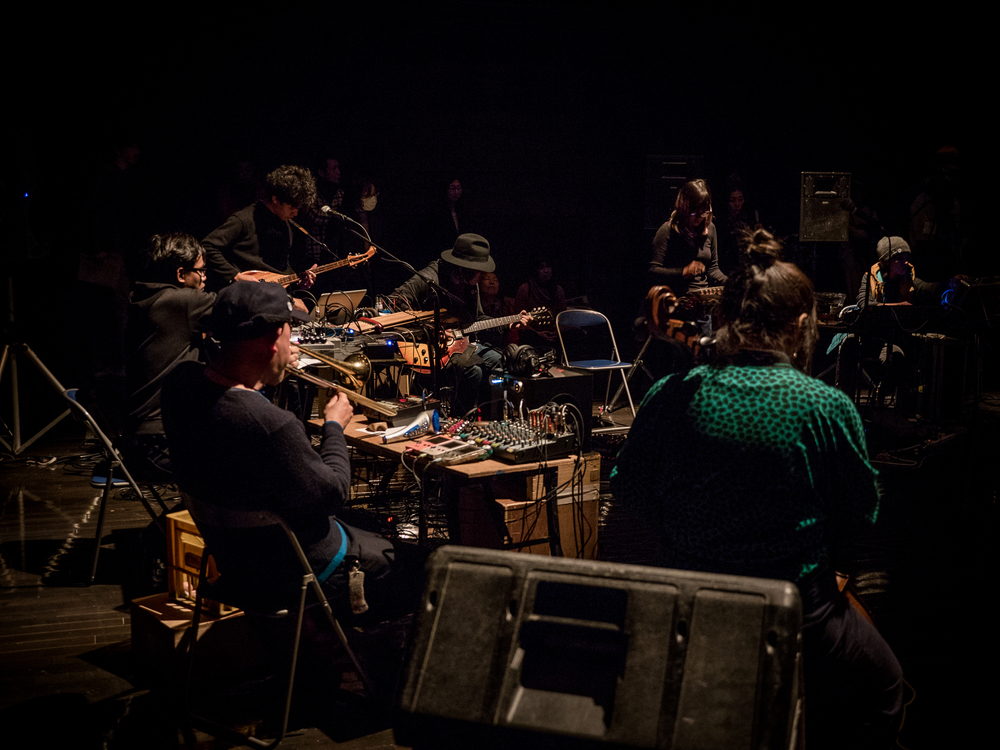Noise Globalization Serves as a Tail Wind for Asian MusicYu Wakao
The improvisation concert was given by a group of fifteen artists from all over Asia and Japan. With their tables topped with tools and devices, the artists positioned themselves in a circle. A couple of the members opened the session. As one of them stopped playing another member joined in, and the music went on in this way. The latter half of the performance saw all members take part.
I heard that organizing the event was no easy task, because the artists who came from various countries were unable to communicate clearly through a common language, like English. At times the musicians had trouble gaining mutual understanding on even basic matters, or so they said. Their backgrounds and music were diverse and some seemed more experienced with free improvisation or noise music than others.
The concert was fascinating, nonetheless. The interesting thing about this kind of music is that experience doesn't necessarily make one's performance better. The artists entertained us thoroughly. After all, why should free improvisation or noise music need a standard form?
This is actually the uniqueness of free improvisation and noise music. The players, despite their jumbled collection of styles, were able to play together without a decent rehearsal because their predecessors had developed and performed free improvisation on numerous occasions. In attempting to rebuff this genre and overcome conventions and standards, the players actually established a new genre while forming new conventions and standards. This type of music is a balance of odd contradictions.
This precariousness, however, also serves as a powerful driver of musical collaboration in this genre. Performances often attain a vague universality because of the low hurdles of musical language. Music said to be borderless used to mean the globalization of Western music that made everyone around the world practice Western musical scales. Therefore, it was really quite amusing to see a concert that seemed to manifest real borderless music.
Globalization has become an inevitable trend facing us today, and while it poses a host of problems, the concert convinced me that globalization of noise music is a marvelous exception. Notable also is how the event materialized in Japan, the world's leader in noise music, thanks to the painstaking efforts of organizer Yoshihide Otomo.
During the concert the audience was allowed to walk around freely to enjoy the diversity of sounds, as if they were strolling about food stalls in a Hanoi street or somewhere else. This style apparently suits the performance of Asian music and can probably be refined further. As I listened to the manifold sounds, I thought it might have sounded different with the participation of Western musicians. None of the members were trying to stand out in this formless, tranquil music. It was like glimpsing an Asian view of the world, perhaps like views drawn from Buddhism or Confucianism, or even like experiencing nirvana. (I don't know if any of the artists were Hindu or Muslim. If there were, I am curious to know whether their sounds added any particular touch to the performance.)
Oftentimes the musical characteristics of Asians are discussed in connection with their nationality. When Asian artists perform overseas, their music is perceived by its Asian nature. I now think this is based on Western perceptions of Orientalism or exoticism, which are also internalized in the performers themselves. There was a time, at least in Japan, when people strongly sought their roots in their own nation; and this tendency continues to exist, but the mindset is undergoing change. I learned that this project has recently managed to receive the Japan Foundation's support. I hope the project will further develop and encourage us to think about the grand subject of musical culture.
Yu Wakao (clinical musicologist)

